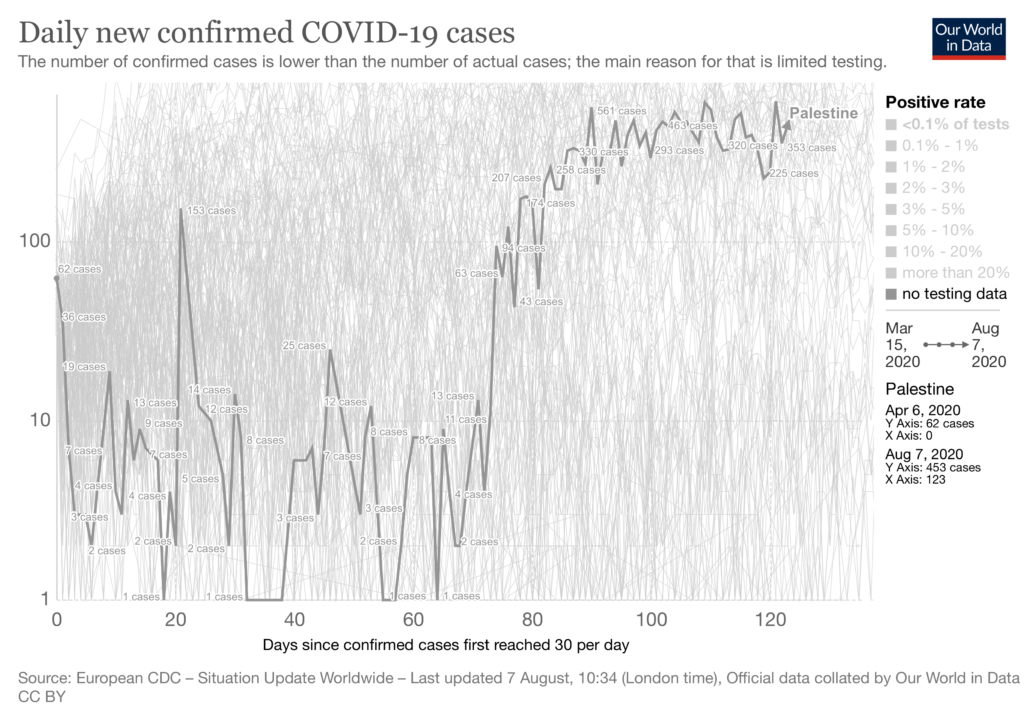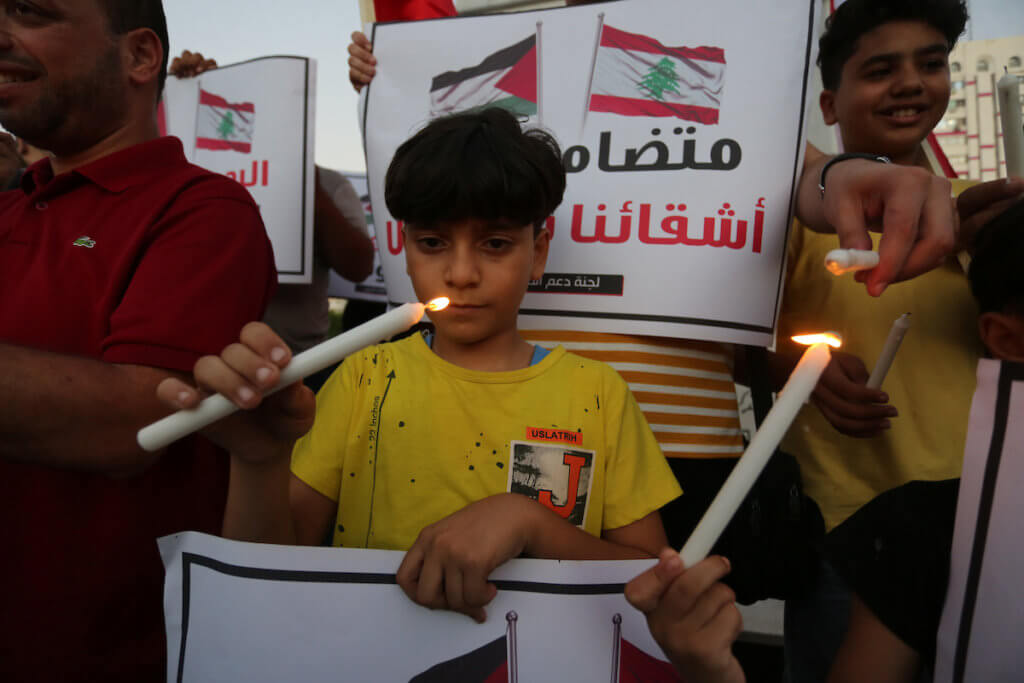The Latest:
- 17,948 Palestinian testing positive for COVID-19; 13,644 in the West Bank; 78 in Gaza
- 97 deaths from Palestinians with COVID-19 related causes; 9 new fatalities in the last week
- 367 average daily new infections among Palestinians since Aug. 1
- Israel’s new coronavirus czar takes office, moves contact tracing to IDF
- 80,991 Israelis testing positive for COVID-19; 581 deaths
This last week has seen Palestinian COVID-19 infections continue on a grim path, at least in the West Bank where there are more than 2,200 new cases. At the same time, the Eid al-Adha holiday last weekend brought a slight reopening of the economy. The Palestinian Authority allowed cafes, restaurants, and gyms to partially serve customers last week and then resumed lockdown during the weekend. Weddings, funeral and large gatherings continue to be banned.
The World Banks’s most recent situation report shows some of the same trends we’ve seen before about who is getting infected. About halh of the cases are among Palestinians under the age of 30, and the largest demographic of infected cases are children, representing at least 3,268 of the total 17,948 cases. Of those with infections, 12 are in critical care, two are on oxygen ventilators.
Palestine’s new infection rate is skyrocketing

Testing is increasing, although it’s still mostly only in the West Bank. To date there have been 207,726 samples tested, of which around 14,000 came from Gaza, reported the Palestinian ministry of health in Ramallah. That breaks down to around 39,178 tests per 1 million and about 17 deaths per every 1 million people, according to Worldometer’s log on global COVID-19 rates.
If we look at Palestine and the U.S. where there are similar rates of testing, the fatality figures look dramatically better for Palestine. The U.S. has 489 deaths per every 1 million. Yet, in Jordan where the context is similar in terms of population, the economy and cramped refugee camps, the fatality rate is considerably higher. Jordan has 1 death per 1 million and a total of 1,231 cases, of whom 1,160 have already recovered. In Palestine, only around half of the total cases have recovered.
While there are a myriad of factors that impact the scope of the coronavirus outbreak in each location, we did notice that Palestine’s recent growth in cases is what is most alarming, rather than their overall numbers of those who tested positive. There is a relative increase of 15,000% in new cases from mid-March to today’s numbers. That makes it the 18th highest rate of increase in new cases out of 194 countries monitored by Our World in Data.

Confirmed cases of COVID-19, new infections per day. (Table: Our World in Data/Source: European Centre for Disease Prevention and Control)
According to the same table, Israel is experiencing an increase of 2,613% more cases this week than from March 15, with around 1,690 new cases yesterday.
Half of medical permits for Palestinians seeking treatment in Israel are denied
In this newsletter we’ve been following the tragic situation of medical permits for the sickest Palestinian patients over recent weeks. The story began in June when the Palestinian Authority ceased coordinating with Israel to secure exit permits from those in the West Bank and Gaza, covering hospital bills for Palestinian patients receiving treatment in Israel, and setting the appointments for chemotherapy or surgery inside of Israel. While Palestinians from the West Bank have the ability to directly file a permit request with Israel’s Civil Administration, those in Gaza are left without a process. Three from Gaza died in the last month awaiting permits, according to Physicians for Human Rights Israel.
PHRI has taken on filing exit permits for Palestinians from Gaza in the absence of the government. Yesterday they released a shocking update: half of their permit requests are denied.
“Only urgent cases – cancer patients, heart disease patients, humanitarian cases involving babies and individuals seeking back-to-back ambulance transport coordination may file an exit permit application,” said PHRI. “All other patients in need of a medical exit permit cannot even submit an applications as they do not meet the criteria.”
195 permits were approved for June and July.
PHRI added a Palestinian with leukemia was detained exiting Gaza at an Israeli checkpoint and questioned by Israeli intelligence agents, “while lying in an ambulance – in violation of medical ethics, and despite having received a permit from the Civil Liaison Administration (CLA) after PHRI’s intervention.”
Israel’s new corona czar
Israel’s new head of its coronavirus taskforce, Ronni Gamzu, took up his post this week and unveiled new plans to slow the curve on Tuesday. Dubbed the “Shield of Israel,” the scheme moved contact tracing from the purview of the ministry of health to the IDF Home Front Command. It’s unclear at this time what kind of personal data the IDF will be privy to, or store during this process.
At least 1.5 million Israelis downloaded a mobile contact tracing app in April that was overseen by the ministry of health.
Gamzu, a former director of Israel’s ministry of health and the head of the General Hospital at Tel Aviv Sourasky Medical Center, said to reporters on Wednesday he is seeking “a path that does not include a full lockdown,” but warned, “that this is the last opportunity for a moderate line.”
“Should morbidity not decline within two weeks, we will be obliged to consider restrictions including the possibility of a local or nationwide lockdown,” he said.
Even so, shopping malls are due to reopen in the next week and Israel will resume air travel in 10 days.
According to the Israeli ministry of health, at least 70 died of COVID-19 related causes in the last week. There are currently 345 critical patients, of whom 100 are on oxygen ventilators.
Standing in solidarity with Beirut

Palestinian children take part in a candlelight vigil in solidarity with the Lebanese people, in Gaza city on August 6, 2020. (Photo: Ashraf Amra/APA Images)
Palestinians are standing in solidarity with the Lebanese people in the wake of a devastating explosion that rocked the city of Beirut this week. The blast, which decimated Beirut’s port and caused immense damage across the city, has injured thousands and claimed at least 157 lives so far, though the death toll is expected to rise even more in the coming days.
In the occupied West Bank and Gaza Strip, Palestinians held a number of vigils in solidarity with Beirut, lighting candles, waving Lebanese flags, and sending messages of love and strength. Meanwhile, photos went viral on social media purporting to show dozens of Palestinians in Gaza lining up to donate blood to send to Beirut amid urgent calls from the Lebanese Red Cross for blood donations.
In Lebanon, which is home to hundreds of thousands of Palestinian and Syrian refugees — communities that are typically ostracized in Lebanese society — Newsweek reported that Palestinian and Syrian refugees living in camps on the outskirts of Beirut “leapt into action, offering their homes and their blood to those in need.” As the true extent of the damage continues to come to light, UNRWA officials have expressed concerns that Palestinian refugees in Lebanon are likely to be among the hardest hit when it comes to expected food shortages as a result of the destruction of the country’s largest port and the majority of its grain reserves. Palestinian refugee communities in the country face a number of discriminatory social and economic policies that prevent and restrict refugees from pursuing higher education and gaining employment in Lebanon.
 RSS Feed
RSS Feed















 August 7th, 2020
August 7th, 2020  Awake Goy
Awake Goy  Posted in
Posted in  Tags:
Tags: 













